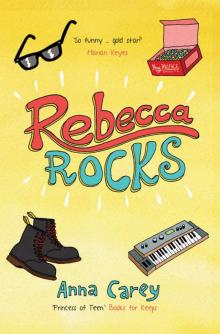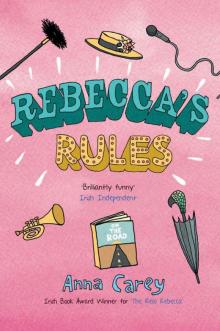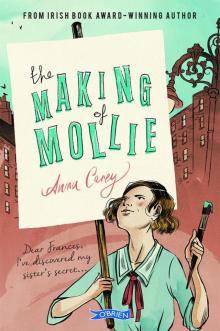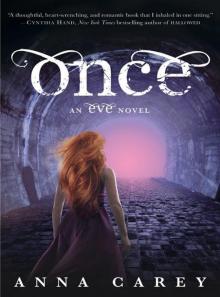- Home
- Anna Carey
Once: An Eve Novel Page 3
Once: An Eve Novel Read online
Page 3
“We can’t talk about this here,” I said, glancing at the row of shrouded storefronts. The front window of a café was covered with newspaper, but I could hear women cooking—pots clanking against one another, water sloshing around in the sink. “Wait until we’re on the boat.”
It was impossible to find privacy in the small city, which housed over two hundred women. A few of the shops and restaurants along the shore were in working order, while others remained hidden and unused in the dense brush. Every woman had carved out a place for herself, a purpose.
“Good morning, Eve!” Coral, one of the oldest Founding Mothers, called as she came down the path. She was carrying three chickens to slaughter, their bodies paralyzed as they hung upside down by their feet. Heddy barked at the birds, but Arden yanked her back. “Beautiful day, isn’t it? Reminds me of life before.” Coral glanced at the sky, the green, tangled hillside, the broken dock that stretched into the water.
“Lovely,” I said quickly, trying my best to smile. I had taken an immediate liking to Coral when I’d arrived. She’d spent her whole life in Mill Valley with her husband. They lived as Strays for three years before he died. I loved the stories she told, of how she’d grown her own garden and cooked on an open fire in her backyard. She’d once lured a gang across town so they wouldn’t discover the stockpile of goods in her storm cellar. But now even she seemed unfriendly. I wondered if she knew about the plan. I wondered if she’d always seen me as a way of negotiating Califia’s independence.
The old woman passed. Up ahead, Maeve and Isis were coming along the path on a horse, towing a cartload of reclaimed clothes. Every month they traveled to a different town beyond Muir Woods and searched the houses to find goods to distribute or barter at the shops in Califia.
I glanced sideways at Arden, then at the rowboat tied to the dock. It was one of the few boats the women had restored, its insides coated with a thin layer of wax. “We better go now,” I said. I could feel Maeve’s eyes on us. She had dismounted and approached the shore as we started toward the dock.
I untied the boat, looking over my shoulder to address her. “Thought I’d take Arden and Heddy out on the bay today. Show them what Califia has to offer.” I climbed in, trying to keep my movements calm and deliberate. I took an oar in each hand, thankful when the wood dipped into the water, the resistance steadying my shaking fingers. Arden lowered herself into the boat and called for Heddy to follow.
“What about the bookstore? There’s work to do,” Maeve said. She stepped over the slippery rocks and into the shallows, letting her hiking boots get wet.
I just kept rowing, my body relaxing with each yard I put between us. “Trina knows I’m not coming in. She said it’s fine.”
Maeve crossed her arms over her chest. She was the most muscular of the women, with a chiseled stomach and legs thick from running. “Be careful of the current! And sharks! One was spotted yesterday in the bay.” I cringed at the mention of sharks, but it seemed unlikely, more like a desperate attempt to keep us tethered to the dock, in her sights. She stood there, feet planted in the water, until we were nearly a hundred yards out.
“Can we talk now?” Arden asked, when I set the oars back down. Heddy settled into the bottom of the boat, her paws outstretched, and Arden planted her feet on either side of the dog’s shoulders.
Maeve had pulled binoculars from the cart and was peering through them, following the boat as it drifted with the current. I smiled, let my hair out of its bun, and waved. “She’s still watching us,” I said. “Stop scowling, Arden, will you?”
Arden threw her head back and laughed, a deep throaty laugh I’d never heard before. “Don’t you see the irony in all of this?” she asked, smiling now, her expression strange, creepy even, because it didn’t match her words. “We’ve traveled all this way to get here, to escape Headmistress Burns, all her lies. This feels oddly familiar.”
I knew what she meant. I hadn’t gone back to sleep the night before. Instead, I’d lain awake imagining what would happen if Maeve found out I knew her plans for me. She believed Califia was my final destination, that I would never leave—that I couldn’t. If she thought I had any desire to run away, she might send word to the City of Sand to let them know she had me.
“When Caleb and I came here we thought it was the only place I’d be safe.” I looked down at my hands, working at the calluses on my palm, thick from time spent reinforcing the low stone wall behind Maeve’s house. “It seemed like my only choice then, but now …”
Over Arden’s shoulder, I could still see Maeve on shore. She had dropped the binoculars and started back up the path, turning to check on us every few steps. I was trapped. Out on the bay, closed in on three sides by high rock walls, a hundred eyes were always watching me, wherever I went. Across the bay, San Francisco was just a tiny, overgrown mound of moss. “We have to get out of here.”
Arden stroked Heddy’s head, gazing beyond me. “We just need time. We’ll figure something out—we always do.” But for a long while neither of us spoke. The only sounds were the waves lapping at the sides of the boat and the gulls calling high above, their wings beating against the sky.
AN HOUR PASSED. THE BOAT DRIFTED WITH THE CURRENT. I was relieved when the conversation turned to lighter topics. “I hadn’t named her yet,” Arden said. She stroked the dog’s head as she spoke. “I just didn’t think we’d be sticking together very long, and I didn’t want to get attached. But then she sat down in front of the fire and I stared at her. And it hit me. I knew just what I should call her.” Arden pressed her palms against her face and pulled down, making her cheeks look like thick jowls. “Heddy—after Headmistress Burns.”
I laughed, my first real laugh in weeks, remembering Headmistress’s sagging face. “That’s a little unfair to Heddy, don’t you think?”
“She understands my sense of humor.” Arden smiled. Her eyes seemed softer, her pale cheeks pink from the sun. “I used to hate dogs. But I wouldn’t have survived without her. She saved me.” Her voice went up a few octaves, as if she were talking to a child. “I love you, Heddy. I do.” She held the dog’s face in her hands and rubbed it, planting kisses on the soft fur of her forehead.
I’d never heard Arden speak that way. The entire time we were at School she’d built a reputation of hating everything—the figs they served with dinner, our math requirements, the board games stacked in the library archives. Arden had prided herself on being separate from everyone else, on relying on no one. She had, for the first twelve years that I’d known her, insisted she was not like the rest of us orphans at School—she had parents waiting for her in the City of Sand. It wasn’t until we found each other in the wild, and Arden became ill, that she disclosed the truth. There were never any parents. Her grandfather, a bitter man who died when she was six, had raised her. Those words—I love you—took me by surprise. I had thought they simply weren’t in her vocabulary.
I let the dog sniff my hand, ignoring my nerves as my fingers approached her mouth. Then I petted her head, stroking her muzzle and ears. I was about to run my hand along her back when something knocked against the underside of the boat. I gripped the sides and looked at Arden, the same thought in our minds: a shark. We were over a hundred yards out in the bay. Maeve was no longer watching us, and the water below was menacingly black.
“What do we do?” she asked, peering over the side. Heddy sniffed the bottom of the boat, growling.
I froze, my hands tightening on the gunwales. “Don’t move,” I said. But the boat rocked again. When I looked over the side, a dark mass was right below us.
“What the hell …,” Arden muttered, pointing into the water. Then she started laughing, her hand covering her mouth. “Is that a seal? Look—there’s more!” Another appeared next to it, then another. Their slick, brown heads popped up from the surface then ducked quickly below.
I loosened my grip on the boat, laughing at myself, at the panicked thoughts of Maeve and Califia, of imagined sharks. “They’
re all around us.” I leaned over the edge, letting my fingertips graze the water. There were nearly ten seals surrounding the boat, their friendly little faces peering up at us. A tiny one flipped over and swam on its back. A few yards away, a larger one with long white whiskers let out a yelping bark. Heddy barked in response, scaring them all below the surface.
“Don’t mind her,” Arden called, looking happier than I’d seen her since we’d escaped. “Heddy, you scared them.” She wagged a finger at the big dog.
The seals took off into the bay. The tiny one looked back, as if apologizing for his friends’ rude behavior. “Nice meeting you, too!” Arden called, raising her hand in a wave. Heddy let out another loud bark, seeming satisfied with herself.
The seals kept going until they were just tiny black dots on the surface of the bay. The sun didn’t seem too bright anymore. The birds were welcome visitors overhead. Sitting in the boat with Arden, I forgot about Maeve and whatever she was planning back on shore. I was with my friend. We were out on the windblown water, alone and free.
six
WHEN WE RETURNED TO THE DOCK, THE SUN WAS LOW IN THE sky. The restaurant that had become Califia’s de facto dining hall was livelier than it had been in weeks. I parted a tangled curtain of vines and ivy, exposing the restored interior. A long bar jutted out from one wall. Wooden tables and benches were crowded together in the center of the room, covered with the remains of boiled Dungeness crab, sole, and abalone. A two-foot-tall statue of Sappho was perched on a shelf in the corner; it had earned the place the affectionate nickname “Sappho’s Bust.”
“Well, looky here!” Betty called from behind the bar, her big cheeks already red from a few beers. “It’s Lady and the Tramp!” The women on the stools all laughed. One took a quick swig of bathtub ale, the homemade beer Betty brewed.
Arden glanced sideways at me, frowning. “I suppose I’m the tramp?”
I took in her shaved head, spotted with scabs, her thin face, her skin crisscrossed with tiny scratches, and her fingernails, still dirty despite two baths. “Yeah.” I shrugged. “You’re definitely the tramp.”
The back doors were open, letting in the smell of the campfire burning behind the restaurant. Delia and Missy, two of the earliest escapees on the Trail, were flipping green coins into one another’s drinks. It was a stupid game they liked to play after dinner, to the exclusion of everyone else. They stopped when Arden and I walked past, Delia nudging Missy hard in the side.
Some women sat along the tables in the back, chatting as they broke apart crab legs. I spotted Maeve and Isis in the corner. Maeve, her sleeves rolled up to the elbows, was opening an abalone shell for Lilac.
Betty set two mugs of beer on the bar. “Where’s the dog?” she asked, checking the floor by Arden’s feet for signs of Heddy.
“Left her behind.” Arden took the mug and swigged it. Then she stared at Betty, her brow furrowed in annoyance, until the woman left to attend to someone at the other end of the bar. Arden swallowed. Her whole body seized as she coughed, the beer nearly coming back up. “Since when do you drink?” she whispered, looking at the amber liquid.
I took a few sips, enjoying the sudden lightness in my head. “Nearly everyone does here,” I said, wiping my mouth with the back of my hand.
I thought of those first days, when I would sit alone in Lilac’s bedroom in the middle of the afternoon, having already completed my chores. Everything had seemed so foreign. The women chopped wood in the clearing above us, the sound following me through the house. The branches rapped on the windows, refusing to let me sleep. Quinn would come retrieve me, insisting I accompany her to the dining hall, where she would sit with me for hours. Sometimes we’d play cards. Betty would pour us her newest batch and I’d sip it slowly, telling Quinn about my journey to Califia.
When I looked up, Arden was still studying me. “Besides,” I added. “It wasn’t exactly easy to lose you and Caleb in the same month.”
Regina, a heavyset widow who’d lived in Califia for two years, teetered on the stool beside us. “Caleb is Eve’s boyfriend,” she whispered to Arden. “I used to have a husband, you know. They’re not as bad as everyone here says they are.” She raised her glass, signaling for another drink.
“Boyfriend?” Arden narrowed her eyes at me.
“I guess,” I said, resting my hand on Regina’s back to steady her. “Isn’t that what he would be called?” At School we’d learned about “boyfriends” and “husbands,” but only to be warned against them. In our Dangers of Boys and Men class, the Teachers told us stories of their own heartbreaks, of the men who had left them for other women or the husbands who’d leveraged their money and influence to keep their wives in domestic slavery. After seeing all that men were capable of in the wild—the gangs who slaughtered one another, the men who sold women they’d captured, the Strays who resorted to cannibalism in desperation—some of the women in Califia, especially the escapees from School, still believed that men were universally bad. Life after the plague seemed to prove that, over and over again. But there were also the few who still remembered husbands or past loves fondly. Many called Regina and me hopeless, to our faces and behind our backs. But when I awoke in the middle of the night, my hands searching the bed for where Caleb should’ve been, hopeless seemed too mild a term for how love made me feel.
Delia and Missy were arguing now, the packed tables quieting as their voices grew louder. Everyone’s attention shifted to their side of the room. “Let it be! Enough!” Delia yelled. She gripped her drink, letting the green coin clink around the bottom of the glass.
“Just tell her,” Missy urged. She turned around in her seat, waving frantically at me. “Eve! Hey, Eve—”
Delia reached over the table and gave Missy one good push, sending her tumbling backward onto the floor. “I told you to shut it,” she said. Missy rubbed her head where it had met the hard wood. “Just shut your stupid mouth,” Delia continued. She got up and started around the table, but Maeve pulled her back.
“All right now. Enough.” Maeve glanced around the room. “Guess you two need to learn to slow down. Isis—get them to bed, will you?” Her eyes darted to me and Arden, as if gauging our reactions.
“Tell me what?” I asked, still stuck on Missy’s words.
Isis laughed. “Missy’s just drunk—right, Delia?” she urged. Delia wiped the sweat from her forehead, but didn’t respond.
“Somebody saw him,” Missy muttered, brushing the dirt off her pants. She was speaking so low I had to stoop down to hear. “Someone saw that boy Caleb. She knows,” she repeated, pointing at Delia again.
Maeve stood and grabbed Missy’s other arm, helping her up. “That’s silly. This is just—”
“I didn’t want to tell you,” Delia started, cutting her off. Everyone in the hall was quiet. Even Betty had stopped talking, standing silently behind the bar with a stack of dirty dishes in her hands. “But when I was in the city the other day, scavenging for supplies, I ran into a Stray. I’d seen him around last week. He’d asked me where I’d come from, where I was heading—”
“You said nothing, right?” Maeve interrupted, her voice flat.
“Of course,” Delia snapped. She was calmer now that she was in Isis’s and Maeve’s grip. She refused to look them in the eye. “He had tried to barter with me for my boots. And then the other day he pointed to the new ones he was wearing and laughed, saying he’d stolen them from a guy he found out on Route Eighty.”
Every part of me was awake, alive, my fingers and toes pulsing with energy. “What did they look like … the boots?”
Delia wiped the corners of her mouth, where a thin coat of spittle had formed. “They were brown with green laces. Came up to about here.” She pointed to the soft flesh above her ankle.
I let out a deep breath, determined to keep calm. They sounded like the boots Caleb had worn as he walked beside me, winding our way through the city streets. I couldn’t be certain. “Was the boy alive?”
“
He said he found him in that furniture warehouse on the side of the road, in that stretch right before San Francisco,” she said, looking at one of the older women. “IKEA? He said that he was badly injured. His leg was infected from a stab wound.”
I only saw Delia’s lips moving, heard the words that were coming out of her mouth. I tried to process them one by one. “Where? Where is that?”
“Now listen.” Maeve put up her hands. “This is probably just a rumor. There’s nothing to prove that—”
“He could be dead by now,” I said softly, the thought even more frightening now that I’d spoken it aloud.
Isis shook her head. “He was probably making it up. He’s a Stray.”
Regina was smiling. “She loves him. She can’t just leave him out there.”
A few of the women started to agree, but Maeve raised her hand to silence them. “No one is going to find Caleb,” Maeve announced. “Because Caleb isn’t even there. The Stray probably lied. They always do.” Then she turned to me, her face full of concern. “Besides, we couldn’t have you going back into the wild now, not with the King after you.”
All I heard were the intentions lurking behind each word. You will never leave here, she seemed to say. I won’t let you. She grabbed my arm and ushered me out, following close behind Isis, who was taking Delia. A few other women helped Missy into a chair, offering her their condolences for the knot forming on the back of her head.
Outside, the night was cold and damp. I slipped out of Maeve’s grip. “You’re right,” I said meekly. “It has to be a lie. I guess I just wanted to believe it.”
Maeve’s face softened and she reached out to squeeze my shoulder. She held Lilac close to her side. “We hear these types of things all the time. Better not to entertain them.”
I shook my head. “I won’t then. I promise.”

 The Real Rebecca
The Real Rebecca Once
Once Rebecca Rocks
Rebecca Rocks Blackbird
Blackbird Rise
Rise Rebecca's Rules
Rebecca's Rules Deadfall
Deadfall Eve
Eve The Making of Mollie
The Making of Mollie Sloane Sisters
Sloane Sisters Survival of the Fiercest
Survival of the Fiercest This Is Not the Jess Show
This Is Not the Jess Show Once: An Eve Novel
Once: An Eve Novel